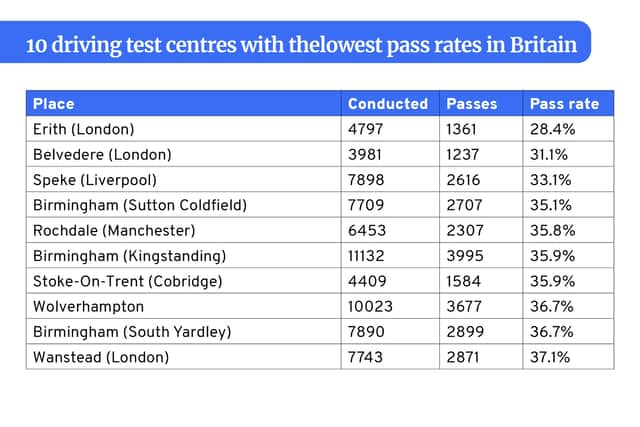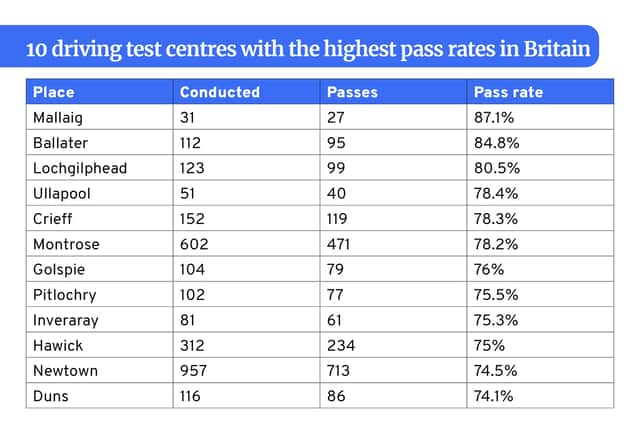Driving test centre pass rates: the DVSA UK sites where learners are most and least likely to fail
and live on Freeview channel 276
New data has revealed the driving test centres with the best and worst pass rates, as new rules are set to make those who fail wait longer for a resit.
Figures from the Driver and Vehicle Standards Agency (DVSA) show massive differences across the country with almost 90% of learners at some Scottish centres passing while less than a third manage to get their licence at centres in London and Birmingham. Across Britain, the average pass rate is 47% and new restrictions due to come into force this summer aim to improve that.
Advertisement
Hide AdAdvertisement
Hide AdFrom this summer, learners who fail the practical test will have to wait 28 days to book a new appointment rather than the current 10. Anyone cancelling a test less than 10 days before their appointment will also lose their booking fees - extended from the current three days.
The DVSA says the changes are intended to ensure learners are fully prepared for the test. It says this will help improve pass rates, saving learners money and freeing up more test slots as it continues to struggle with huge waiting lists.
Although the driving test content is the same wherever you sit it, the figures suggest that factors such as traffic levels and the types of road learners face could have an impact on the likelihood of them passing. Nine of the 10 centres with the worst pass rates are in busy city locations while all 10 of the centres with the best results are in relatively small, rural areas.
London and Birmingham proved to be particularly tough for learners, with three test centres in each city among the 10 worst performing. Erith in London had the worst pass rates in 2021-22, with just 28.4% of candidates achieving a pass. Behind was another London centre - Belvedere, where just 31.1% of learners passed.
Advertisement
Hide AdAdvertisement
Hide AdCompleting the top five were Speke in Liverpool (33.1%), Sutton Coldfield in Birmingham (35.1%) and Rochdale in Greater Manchester (35.8%).


While the test centres with the poorest pass rates were also among the country’s busiest, quieter centres in Scotland dominated the list of the highest pass rates obtained by insurance specialist GoCompare.
Mallaig in the west Highlands saw just 31 learners sit their test, 27 of whom passed - a success rate of 87.1%. Just 112 learners took their test in Ballater, Aberdeenshire, but with 95 passing it recorded a success rate of 84.8%. Behind them, Lochgilphead, Ullapool and Crieff hosted between 51 and 152 tests each, with respective pass rates of 80.5%, 78.4% and 78.3%.
Ryan Fulthorpe, motoring expert at GoCompare, said the different conditions faced by learners in different locations, along with the sheer number of learners taking their tests in some locations, could be behind the large regional variations. He commented: “The driving test backlog is affecting learner drivers across the UK, and we welcome efforts to tackle it.
Advertisement
Hide AdAdvertisement
Hide Ad“It is important to make sure you are as prepared as you can be before you book and take your test, and having a longer wait period after a failed test may give learners time to understand what they need to improve on, and address what went wrong more fully.


“While there are a number of factors that will affect what happens on the day our research shows your choice of test centre could make a difference too. Rural Scottish driving test centres boast the best pass rates across the UK – though they are also some of the quietest. On the other hand, test centres with the lowest pass rates are much busier in comparison – with all conducting well over 7,000 tests and urban areas dominate the lower end of the scale. With the added challenges of built-up roads, big intersections and traffic jams, this may not come as a surprise.”
